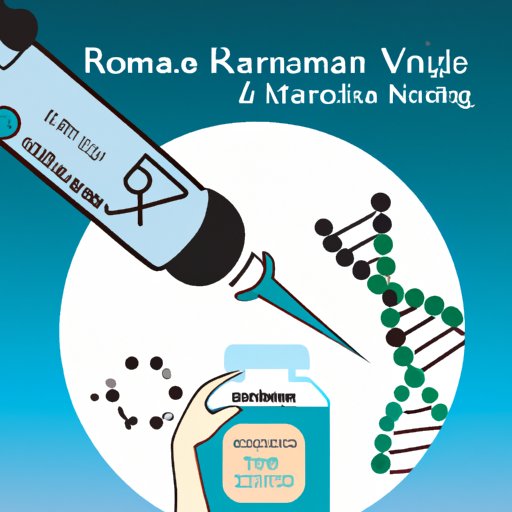Introduction
The emergence of the COVID-19 pandemic has led to a global effort to develop a vaccine. One of the most promising types of vaccines for this virus is the mRNA vaccine. But what is an mRNA vaccine and how does it work? This article will provide a comprehensive overview of mRNA vaccines, including how they work, the development process, and their effectiveness.

Explaining the Science Behind mRNA Vaccines
To understand how mRNA vaccines work, it is important to first understand the role of mRNA in the body. Messenger RNA (mRNA) is a type of genetic material that carries instructions from DNA to ribosomes, which are responsible for making proteins. These proteins can then be used by the body to create antibodies, which are the body’s defense against disease. In other words, mRNA is responsible for translating genetic instructions into proteins that can protect the body against infection.

An Overview of mRNA Vaccines and How They Work
Now that we have a better understanding of mRNA, let’s look at how mRNA vaccines work. mRNA vaccines are designed to mimic natural mRNA and deliver instructions to the body to create antibodies that will protect against disease. The mRNA vaccine works in two steps: first, the mRNA is synthesized in a laboratory; second, the mRNA is injected into the body, where it instructs cells to make the necessary proteins to create antibodies.
A Comprehensive Guide to mRNA Vaccines
The benefits of mRNA vaccines are numerous. For one, they are much faster to produce than traditional vaccines, as they can be developed and tested in a matter of weeks. Additionally, mRNA vaccines are highly customizable and can be tailored to target specific viruses or bacteria. Finally, mRNA vaccines have been shown to be safe and effective in clinical trials.
While mRNA vaccines have many benefits, there are also potential side effects. Common side effects include pain or swelling at the injection site, fever, chills, and fatigue. Fortunately, these side effects are usually mild and temporary.
Examining the Process of Developing an mRNA Vaccine
Developing an mRNA vaccine requires several steps. First, scientists must identify the virus or bacteria they want to target and determine which proteins are necessary to create antibodies. Next, they must design the mRNA molecule that will carry the instructions for producing those proteins. Once the mRNA is designed, it must be synthesized in a laboratory and then tested to ensure it is safe and effective.
The process of developing an mRNA vaccine can be challenging. For one, mRNA is highly unstable, meaning it must be kept at very low temperatures in order to remain effective. Additionally, mRNA vaccines must undergo extensive testing before they can be approved for use in humans, which can be a lengthy and costly process.
Understanding mRNA Vaccines and Their Effectiveness
Before an mRNA vaccine can be approved for use, it must go through rigorous clinical trials. During clinical trials, the safety and effectiveness of the vaccine are evaluated in a controlled environment. The results of these trials will determine whether or not the vaccine is safe and effective for use in humans.
In addition to clinical trials, researchers must also evaluate the long-term efficacy of mRNA vaccines. While early studies have shown promising results, more research is needed to understand how long the immunity provided by an mRNA vaccine will last.

Comparing mRNA Vaccines to Traditional Vaccines
When comparing mRNA vaccines to traditional vaccines, there are both advantages and limitations. On one hand, mRNA vaccines are much faster to produce, require fewer doses, and can be tailored to target specific viruses or bacteria. On the other hand, mRNA vaccines are more expensive to produce and may not provide long-term protection against disease.
Conclusion
In conclusion, mRNA vaccines are a promising new technology with many potential benefits. They are faster to produce, safer, and more effective than traditional vaccines. However, there are still many unanswered questions about mRNA vaccines, such as how long the immunity they provide will last. As more research is conducted, we will gain a better understanding of the science behind mRNA vaccines and their potential to help us fight infectious diseases.
Overall, mRNA vaccines are an exciting new technology that has the potential to revolutionize the way we immunize against infectious diseases. As we learn more about mRNA vaccines, we can continue to refine and improve upon the technology to create even more effective vaccines.
(Note: Is this article not meeting your expectations? Do you have knowledge or insights to share? Unlock new opportunities and expand your reach by joining our authors team. Click Registration to join us and share your expertise with our readers.)
